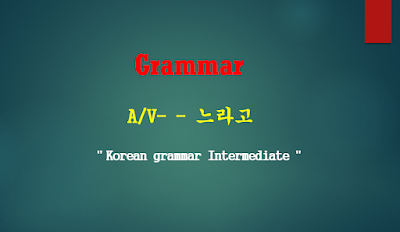Usage:
- 느라고: 이 표현은 선행절에 오는 말이 후행절에 오는 말의 이유나 원인이 됨을 나타냅니다. 후행절에는 주로 부정적인 이야기들이 옵니다. '-느라'라고 사용해도 됩니다.
This expression indicates that the statement given in the preceding clause is the reason form or cause of the following clause. In most cases, the following clause is negative in nature. This expression is sometimes shortened to 느라.
Conversation1
나: 어젯밤에 축구를 보느라고 숙제를 못 했어요.
A: Jaya, why didn't you do your homework?
B: I couldn't do my homework last night because I was watching a soccer game
Conversation 2
가: 주말에 뭐 하셨어요?나: 김장했어요. 김장을 하느라고 정말 힘들었어요.
A: What did you do over the weekend?
B: I made kimchi. (Because of that,) I was really exhausted
More examples:
1.
가: 요즘 카일리 씨는 어떻게 지내요?
나: 결혼 준비를 하느라고 정신이 없는 것 같아요.
A: How's Kylie doing these days?
B: She seems really busy due to preparing to get married.
2.
가: 시험때문에 믾이 바쁘지요?
나: 네, 요즘 시험공부를 하느라고 친구들을 통 못 만났어요.
A: You're really busy because of all your tests, right?
B: Yeah, these days I haven't been able to meet my friends at all because of my test prep
1. 출입국관리사무소에 가느라고 학교에 못 갔어요.
I wasn't able to go to school because I went to the immigration office.
2. 데이트를 하느라고 요즘 시간이 없어요.
I don't have time these days because I'm on a date.
3. 야근하느라고 수고하셨어요.
4. 그동안 우리를 가르치시느라고 고생 많으셨어요.
5. 보고서를 쓰느라고 3일 밤을 못 잤어요.
6. 아이를 보느라고 출입국관리사무소에 갈 수가 없어요.
7. 요즘 퇴근 후에 한국어를 배우느라고 드라마를 못 봤어요.





![[Video Lesson] V- (으)ㄹ 바에는[바에야] (차라리)](https://blogger.googleusercontent.com/img/b/R29vZ2xl/AVvXsEiwkGyP7qlWFSS_w4M6KJl9Zus3mNEUFyWqirgTm_YpQhlgXkzUHGh3En5C_IUG3c2wZEGw7SKiWf5SksJ2slpjR5x12uCpM2ML_u7BkYPU4gd8MwjXpsOyF8Kiojo2qmX6ujX5n-T6CG9462zac6JTkHfHGwYh0hJNQTVvXpCAdEtl2ItTTSQn8mL9WQ/w680/%EB%B0%94%EC%97%90%EB%8A%94%5B%EB%B0%94%EC%97%90%EC%95%BC%5D%20(%EC%B0%A8%EB%9D%BC%EB%A6%AC)video.PNG)
![EPS-TOPIK Test [Listening-2]](https://blogger.googleusercontent.com/img/b/R29vZ2xl/AVvXsEi4eCnsMh8pDQqBXrE9T_u886vg4dQs0yRYeQ6QgfsqdS0hkZ4318tzwJuoEuaR_QBSbIW-Fs_EGtGEQXjyhaUm7sgUEEOmehdyrbUdXbHCkN9m2NdxO4zY4jNwaj9uJcwdxVMGxLflcuEDrPBYxps4M-ARAAbzsFRSGdm3FKVZjaF_wrCMOdGkBM649Q/w680/eps%20topik%20test.PNG)
![커녕 [Intermediate Grammar]](https://blogger.googleusercontent.com/img/b/R29vZ2xl/AVvXsEhKckQtTreCTRfHaKeCFIS3r410JgLpD93HfuPh-YKUiIxtTIAMhb8__BtxbSsv7_6pw15v-K9MBrz_KpVmbdLKcv8AxQG318qDDEzrap7KhfEA10WYUjXCzZas7rCrmmGp0ZbMEWvAuJavEZHYRGUcw_AuHPgJ1ZscGOqhEYQhS2Rg38Mc6qyj9kCZhg/w680/%EC%BB%A4%EB%85%95.PNG)
